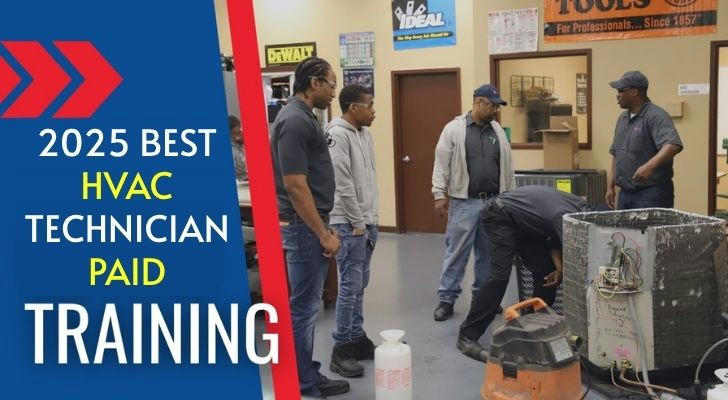2025 Best HVAC Technician Paid Training Program and Certification Guide in the United States
Considering a career as an HVAC technician? Which paid training programs and certifications will best prepare you for this growing field?

The HVAC industry is experiencing rapid growth across the United States, with employment projected to increase by 9% through 2033, outpacing the average for all occupations. Despite this demand, a significant technician shortage exists, with approximately 225,000 vacancies and nearly two jobs available per qualified worker. Securing training through top paid programs not only accelerates skill development but also ensures familiarity with the latest technologies and safety standards critical to success in this dynamic industry.
Paid HVAC Training Programs
Paid HVAC training programs combine classroom instruction with practical, hands-on experience, and in many cases, provide students with opportunities to receive compensation during their training period. However, it is important to note that participation in such programs may require a minimum service period with the sponsoring employer or institution, and leaving the program prematurely could result in financial penalties or repayment of certain costs, as specified by the program’s policies. These programs often include apprenticeships or partnerships with industry employers, offering a direct pathway to employment.
Typical program features include:
- Comprehensive technical coursework covering heating, ventilation, air conditioning, refrigeration, and emerging smart technologies
- Safety and regulatory compliance training, including EPA Section 608 certification for refrigerant handling
- Real-world experience with modern HVAC equipment and diagnostic tools
- Soft skills development such as customer service, problem-solving, and communication
Certification requirements generally involve completing a state-approved training program or apprenticeship, followed by passing relevant licensing exams. Many programs support obtaining additional certifications like NATE or HVAC Excellence, boosting employability and specialization.
Salary Expectations for HVAC Technicians
According to recent data, the median annual wage for HVAC technicians is approximately $59,810, or $28.75 per hour. Entry-level technicians typically earn around $37,270 annually, while those with 10 or more years of experience can see earnings rise to $84,250 or more. Salaries tend to increase with certifications, advanced skills, and the ability to manage complex systems, making paid training programs a valuable investment.
Top Paid HVAC Training Programs in the United States
Johnson County Community College (Kansas) – Offers a two-year associate degree with residential and commercial HVAC tracks, emphasizing hands-on training and strong job placement support.
North Dakota State College of Science – Focuses on HVAC engineering technology with small class sizes and modern labs.
UC Berkeley Extension (California) – Provides industry-designed programs aligned with ASHRAE certification standards.
Foothill College (California) – Combines strong academic rigor with student support services.
Gateway Community College (Arizona) – Features career services and job placement assistance.
New England Institute of Technology (Rhode Island) – Offers extensive hands-on training with industry-standard equipment.
Penn Foster Career School (Online) – Flexible, self-paced, and nationally accredited with career support services.
Lincoln Technical Institute – Multiple campuses provide job placement assistance and industry partnerships.
Universal Technical Institute – Specializes in automotive and industrial HVAC with multiple certification options.
Refrigeration School Inc. – Emphasizes refrigeration specialties with strong employer connections.
These programs consistently integrate paid apprenticeships or work-study options, allowing students to gain practical experience while earning compensation, and may include specific service commitments or other participation requirements as detailed by each provider.
Why Choose Paid Training Programs?
Opting for paid HVAC training offers several distinct advantages:
- Financial support while acquiring essential skills reduces the burden of education costs, though this may be accompanied by a required minimum period of service or other obligations as outlined in program agreements.
- Early exposure to workplace environments fosters professional growth and readiness.
- Partnerships with employers increase hiring opportunities upon program completion.
- Training on current, energy-efficient, and smart HVAC technologies prepares technicians for industry evolution.
Advancing Your HVAC Career
Paid training programs often provide pathways for continuing education, including refresher courses and leadership development. Embracing ongoing education helps technicians stay current with technological advancements such as smart system controls and eco-friendly HVAC solutions.
Summary
- The HVAC industry is expanding rapidly, creating strong demand for trained technicians.
- Paid training programs offer valuable hands-on experience combined with financial support, which may include service commitments or other terms as specified by the program.
- Certification and licensing ensure technicians meet current safety and technical standards.
- Establishing partnerships between employers and training institutions benefits workforce readiness.
- Ongoing education and embracing technological advancements are critical for long-term career growth.
Choosing the right paid HVAC training program and certification path in 2025 positions aspiring technicians for a rewarding and secure career in this essential industry.
